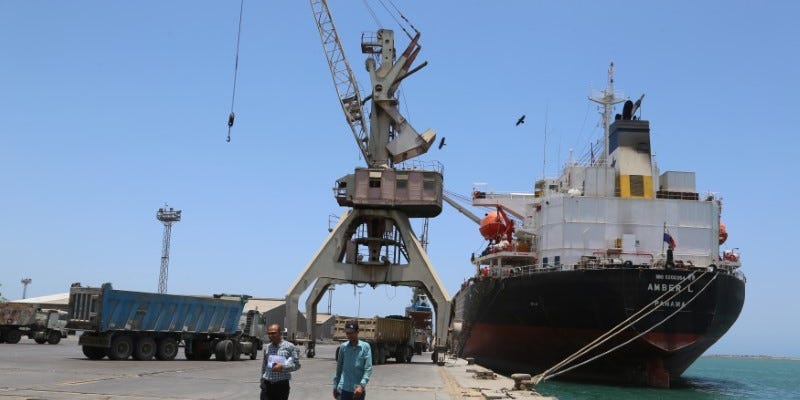
Thomson Reuters
- One of the largest oil tankers in the world is 'dead' off of Yemen's coast and could sink any day.
- According to the New Yorker, the ship holds over a million barrels of oil.
- Yemenis are at serious risk of air pollution and food shortages if the ship sinks.
- See more stories on Insider's business page.
An ailing, powerless oil tanker stationed off of Yemen's coast could explode or sink any day endanger the lives of at least eight million Yemenis, cause an environmental catastrophe, and cost the shipping industry billions, according to a report from The New Yorker.
The F.S.O. Safer, an ultra-large crude oil tanker stationed near Yemen's Hodeidah port and owned by the Yemeni Safer Exploration & Production Operations Company, has been "dead" since 2017, meaning that its steam boilers have given out.
Safer is reportedly too big for the Suez Canal and nearly too large for the English Channel. According to the report, the vessel was built in 1976 and it's one of the largest oil tankers in existence, with over a million barrels of oil on board.
"A spill from the Safer could take months to clear, imposing a toll of tens of billions of dollars on the shipping business and the industries it services," The New Yorker's Ed Caesar reported, noting that ships don't often cross oil spill waters. "[Non-profit] ACAPS estimated that the cleanup alone could cost twenty billion dollars."
The New Yorker report notes that in "the worst forecasts" the oil spill from Safer could reach the Bab el-Mandeb Strait, where in terms of cargo about 10% of the world's trade passes each year.
"Closure of the Bab el-Mandeb Strait could keep tankers originating in the Persian Gulf from transiting the Suez Canal or reaching the SUMED Pipeline, forcing them to divert around the southern tip of Africa, which would increase transit time and shipping costs," according to the US Energy Information Administration, which notes that the strait is an important route for oil and natural gas shipments.
"In 2018, an estimated 6.2 million barrels per day (b/d) of crude oil, condensate, and refined petroleum products flowed through the Bab el-Mandeb Strait toward Europe, the United States, and Asia," the US Energy Information Administration reported.
The company that owns Safer reportedly only has enough money to make minor repairs on the ship annually, and Houthi rebels who control the Marib oil fields near where the ship is stationed have obstructed any efforts by the United Nations or NGOS to dislodge or drain the boat.
Aboard, a skeleton crew is fighting desperately to prevent the ship from sinking, exploding, or causing a massive oil spill - all scenarios that would have devastating consequences for Yemenis already engulfed in a humanitarian crisis.
If the ship sinks and the oil is spilled, the air would be polluted for at least eight million Yemenis, according to the report. The vessel's former chief engineer reportedly said that the ship "moves forwards each day towards the worst."
And as tens of thousands struggle with famine and millions lack access to basic goods with the ongoing war, a spill could block the port of Hodeidah, which is where two-thirds of Yemen's food arrives, according to the report.
The report added that Yemen's Red Sea fishing industry would be completely decimated with the Safer sinking and spilling, and the UN, "has no contingency plan to accommodate a shutdown of the Hodeidah."
